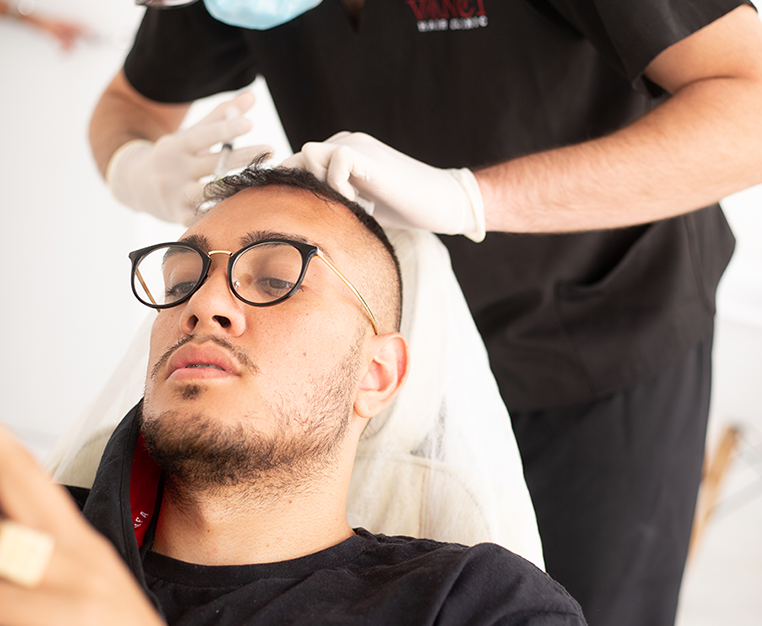Experiencing hair loss is a difficult time for any man. Younger men may feel the loss more keenly, but that doesn’t mean that older males aren’t stressed by the experience too. What makes the whole thing harder is the lack of reliable information on the subject. Actually, that’s not strictly true: reliable information is available, but it tends to get buried underneath a mountain of hair loss myths and half-truths.
This kind of junk information can be harmful. In the first place, it can add to the distress of hair loss by exaggerating potential ‘worst case’ outcomes. It can also heighten fears in those who are unlikely to lose their hair at all. Finally, it can prevent people from seeking treatment for the underlying cause of their problem.
This article will attempt to separate some common myths and half-truths about hair loss from the hard facts.
Myth # 1: Hair Loss Comes from Your Mother’s Side
Most of us will be familiar with this one, but it’s only partly true. While an important baldness gene is found on the X chromosome that only comes from your mother, that’s by no means the whole story. Research has shown that male pattern baldness is polygenic, meaning it involves more than one gene. That’s why you’re just as likely to experience male pattern baldness if your father has the condition.
Myth # 2: Men with More Testosterone Experience Greater Hair Loss
The idea that baldness is somehow linked to an excess of manly testosterone is probably a myth that bald men use as a comfort! It’s true that hair loss results from the conversion of testosterone to dihydrotestosterone (DHT). It’s also true that DHT causes the miniaturisation of hair follicles, the process that results in male pattern baldness. It doesn’t follow, however, that the more testosterone you have, the quicker you’ll lose your hair. It isn’t even accurate to say that more DHT results in faster hair loss. That’s because it’s an individual’s susceptibility to DHT, not the quantity, that determines the extent of their hair loss.
Myth # 3: Wearing Hats Leads to Hair Loss
Like all good myths, there is a tiny element of truth contained in this one. It’s distorted beyond recognition, undoubtedly, but it’s there if you look hard enough. It’s the notion that if you wear a cap or beanie, the friction it generates will be enough to cause baldness.
The ‘friction’ that causes hair loss is called traction alopecia. It results from tight hairstyles that subject the hair follicles to pulling and tearing over a long period. This can result in hair loss, though it’s the type of loss that is reversible. Wearing a hat or cap (or even a crash helmet) doesn’t generate this kind of pressure on your hair.
Myth # 4: Stress Will Make Your Hair Fall Out
Stress doesn’t cause you to shed any more hair than you did before you became stressed. Men lose somewhere between fifty and one hundred hairs a day as part of the natural growth cycle. These are lost during the resting phase of hair growth and replaced during the regrowth period.
What stress does do is interfere with the regrowth part of that cycle. It triggers the release of the steroid hormone cortisol into the body. Prolonged exposure to this hormone inhibits the growth cycle by shutting down the hair follicles, thus preventing the lost hair from being replaced. This can cause noticeable thinning of the hair. Some good news: once the stress is lifted, your hair will grow back, though this might take a few months.
Myth # 5: All You Need Is a Good Supplement
There is a theory that all you need to do to fight a receding hairline is to pop the occasional supplement. Two that get mentioned a lot in this context are biotin and saw palmetto. The latter is a common ingredient in haircare products due to its ability to combat DHT, while biotin is known to support hair growth, but are they really a reliable defence against hair loss?
If you’re relying on just these supplements, the answer is no. Some forms of hair loss will require a more powerful intervention involving medication or surgical treatment. A proper diagnosis of your condition is required by a medical or haircare professional. Supplements can form part of your overall haircare regime, but they’re not a panacea for hair loss.
Conclusion
Hopefully, this article has been useful in putting right a few misconceptions surrounding male hair loss. If you’re clear about the problem you’re facing, you have a much better chance of dealing with it effectively.
If you have concerns about hair loss, Vinci Hair Clinic is here to help. We can answer your questions and provide advice on possible treatments. We offer a free, no-obligation consultation with one of our hair experts to all new clients. All you have to do is get in touch with us and book an appointment. Do it today!



